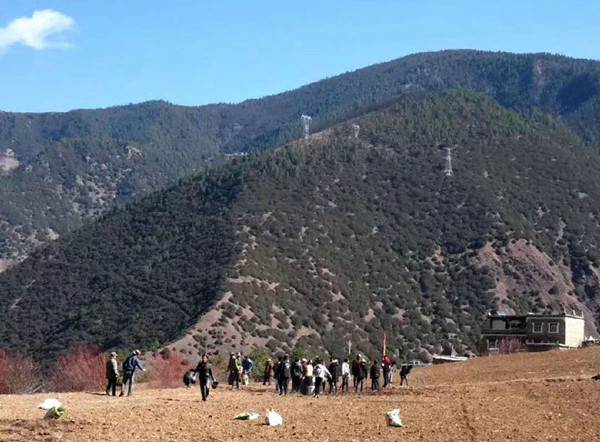NORINCO Group Alleviates Poverty in Sichuan County by Promoting Industries
Local economies are growing vigorously in the Tibet autonomous prefectures in Southwest China's Sichuan province as some areas have been removed from the poverty-alleviation lists thanks to industrial projects promoted by central SOEs.
Milong village of Yajiang county in Ganzi Tibetan autonomous prefecture was one of them.

Located at the west bank of the Yalong River, Milong village lies in the plateau mountain area at an altitude of 3,500 meters. It has barren land and limited resources. [Photo/sasac.gov.cn]
Luzhou North Chemical Industries Co., Ltd. of China North Chemical Research Academy Group Co., Ltd., a subsidiary of China North Industries Group Corporation Limited (NORINCO Group), shouldered the targeted poverty-alleviation mission of Milong village in 2016.
By the end of 2019, the annual per capita income of the village improved from 2,600 yuan ($365.53) in 2015 to 4,500 yuan.
Located on the west bank of the Yalong River, the village is 50 kilometers away from Yajiang county and lies in the plateau mountain 3,500 meters above sea level, with barren land and limited resources.
The company sent its employees to inspect the village and to learn the local environment and resource conditions. By communicating with the local government and inviting professors at Sichuan Agriculture University to give suggestions on promoting varieties of projects such as planting the seasonal yellow morels or Morchella esculenta and traditional Chinese herbs, or feeding cows and initiating agricultural product deep processing in the village to help the villagers escape poverty.
In 2016, a seasonal yellow morel farming cooperative was established in the village. Luzhou North Chemical Industries Co., Ltd. invested in the greenhouse construction for each household and invited specialists to give professional guidance on planting procedures.
In March 2017, villagers harvested more than 75 kilograms of yellow morel and each family received about 1,200 yuan of profit.
In addition to the yellow morel, the company planted traditional Chinese herbs in the village after inspection and consultancy from the experts in 2017.
The company also made a printed guide to technical planting skills to instruct villagers. In the spring of 2019, all Bletilla striata covering 15 mu (1 hectare) sprouted vigorously and the Milong cooperative welcomed purchase orders from traditional Chinese herb bases.
It is estimated that within three years, the annual benefit of the herbs will reach 100,000 to 150,000 yuan.
To improve the economic value of the agricultural products, the deep processing industry was also promoted in the village.

The Milong-produced local grown mushrooms and bamboo shoots [Photo/sasac.gov.cn]
By the end of September 2018, the Milong cooperative had signed an agreement with Yibin-based Youzheng Agriculture Co., Ltd on production of 50,000 jars of mushrooms and bamboo shoots, valued at about 120,000 yuan.
The jars were later improved and are expected to create 200,000 yuan of profit despite the COVID-19 pandemic.
What's more, the company also provided each household with 4,000 yuan to help them buy cows which can increase their income by about 1,500 yuan each.
In addition, the village cooperative also invested 300,000 yuan in a national photovoltaic poverty-alleviation project. The dividend of the project can last for 25 years, which guarantees parts of the villagers' income for that period.
Power device maintenance, daily necessity donations and education support have also been given to the villagers.
Luzhou North Chemical Industries Co., Ltd. said it intends to not only help the village get rid of poverty but also to help the villagers live better lives.
(Executive editor: Wang Ruoting)



